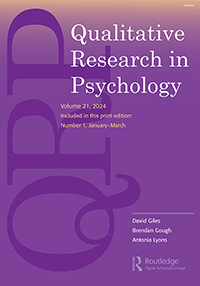在定性研究中不保持中立的艺术
IF 4.4
3区 心理学
Q1 PSYCHOLOGY, MULTIDISCIPLINARY
引用次数: 0
摘要
本文是对定性研究中关于中立性的伦理和方法标准的持续争论的贡献。通过援引基于友谊的研究和情境伦理的概念,我们讨论了当线人和研究者发展友谊般的关系时,在研究过程中可能出现的重要伦理困境。我们考虑了这种方法的优点和缺点,特别是在敏感领域工作时-在这种情况下,精神病诊断和帮派退出过程对身份形成的影响。我们挑战了个人不参与定性研究的传统理想,特别是在伦理问题方面,通过分析和讨论一个研究小组建立过程中不可预见的事件的案例,该小组将正式的线人-研究者关系转变为基于友谊的研究。本文章由计算机程序翻译,如有差异,请以英文原文为准。
The art of not being neutral in qualitative research
ABSTRACT This article is a contribution to the ongoing dispute about ethical and methodological standards of neutrality within qualitative research. By invoking the notions of friendship-based research and situated ethics, we discuss important ethical dilemmas that can arise in research processes when informant and researcher develop friendship-like relations. We consider the benefits and drawbacks of such an approach, especially when working within sensitive fields – in this case, the impact of psychiatric diagnoses and gang exit processes on identity formation. We challenge traditional ideals of personal non-involvement in qualitative research, particularly with regard to ethical issues by analyzing and discussing a case of unforeseen events during the establishment of a research group that transformed a formal informant – researcher relationship into friendship-based research.
求助全文
通过发布文献求助,成功后即可免费获取论文全文。
去求助
来源期刊

Qualitative Research in Psychology
PSYCHOLOGY, MULTIDISCIPLINARY-
CiteScore
20.00
自引率
0.50%
发文量
14
期刊介绍:
Qualitative Research in Psychology is an international, peer-reviewed journal that publishes high-quality, original research. It aims to become the primary forum for qualitative researchers in all areas of psychology, including cognitive, social, developmental, educational, clinical, health, and forensic psychology. The journal also welcomes psychologically relevant qualitative research from other disciplines. It seeks innovative and pioneering work that advances the field of qualitative research in psychology.
The journal has published state-of-the-art debates on various research approaches, methods, and analytic techniques, such as discourse analysis, interpretative phenomenological analysis, visual analyses, and online research. It has also explored the role of qualitative research in fields like psychosocial studies and feminist psychology. Additionally, the journal has provided informative articles on ethics, transcription, interviewee recruitment, and has introduced innovative research techniques like photovoice, autoethnography, template analysis, and psychogeography.
While the predominant audience consists of psychology professionals using qualitative research methods in academic, clinical, or occupational settings, the journal has an interdisciplinary focus. It aims to raise awareness of psychology as a social science that encompasses various qualitative approaches.
In summary, Qualitative Research in Psychology is a leading forum for qualitative researchers in psychology. It publishes cutting-edge research, explores different research approaches and techniques, and encourages interdisciplinary collaboration.
 求助内容:
求助内容: 应助结果提醒方式:
应助结果提醒方式:


